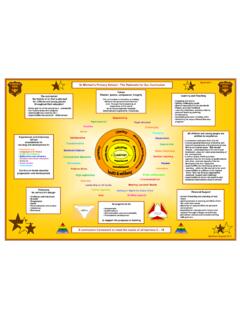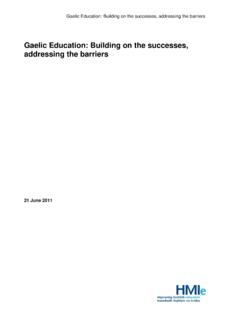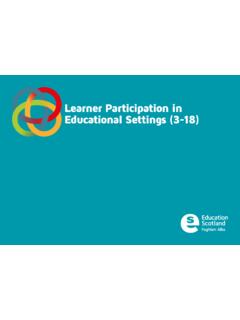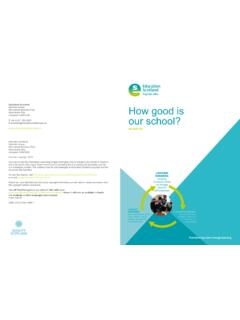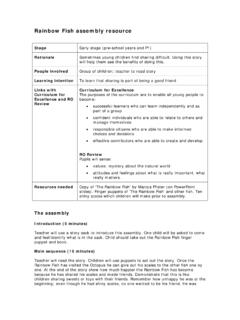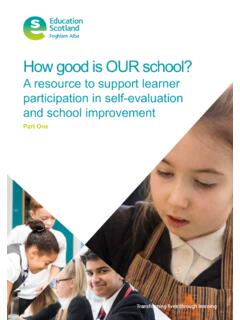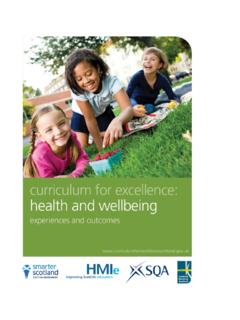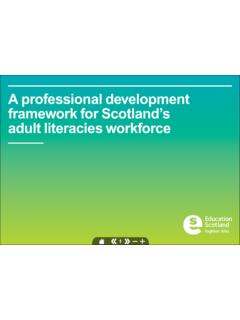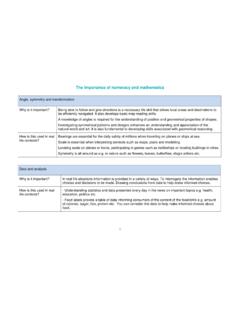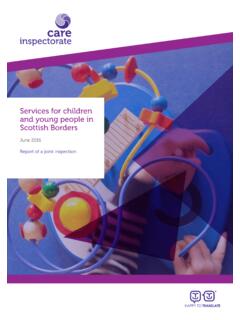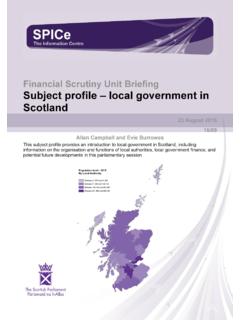Transcription of English for Speakers of Other Languages (ESOL)
1 English for Speakers of Other Languages (ESOL) Impact Report 2015 - 2016 A summary of ESOL activity supported by the additional ESOL funding from the Scottish Funding Council for 2015-16 Contents Background .. 3 Overview in Figures .. 3 ESOL Provision in Context .. 3 Building Capacity of the Sector .. 9 Developments in 2015-2016 .. 10 Strategic Objectives .. 12 Unmet Demand .. 14 Conclusions and Considerations .. 15 Case Studies .. 16 Links and Outputs .. 23 Background In 2015 16, 1,455,000 was allocated to Community planning Partnerships to support the delivery of English for Speakers of Other Languages (ESOL) Programmes. This funding supports the national strategy for ESOL stating as its vision: That all Scottish residents for whom English is not a first language have the opportunity to access high quality English language provision so that they can acquire the language skills to enable them to participate in Scottish life: in the workplace, through further study, within the family, the local community, Scottish society and the economy.
2 These language skills are central to giving people a democratic voice and supporting them to contribute to the society in which they live. (Welcoming Our Learners: Scotland s ESOL Strategy 2015-2020) The funding that is reported on in this document enables providers to deliver more programmes using a partnership approach through coordinated planning . The funding is distributed to ESOL providers within a Community planning area via a nominated College within the Community planning Partnership. Overview in Figures In 2015 -16, 1,455,000 was allocated to Community planning Partnerships to support the delivery of ESOL programmes. As a result of this 10,401 learning opportunities were 2238 learners achieved SQA accreditation which represents just over 20% of the total number of learning opportunities made available. 50 practitioners achieved accreditation for continuing professional development opportunities.
3 A total of 135 projects were proposed for the fund. 117 are reported as being complete giving an 86% completion rate. ESOL Provision in Context 1 Although this may appear to be a decrease from previous years, comparisons with previous years is not possible. The figure does not include the number of participants taking part in one-off events or practitioners undertaking training whereas in previous years these numbers were included. 3 | English for Speakers of Other Languages : Impact Report 2015-2016 This section provides a summary of provision offered by the partner providers in each Community planning Partnership area. Providers include college, community learning and development (CLD) and third sector organisations. ESOL through Community Learning and Development Partners Community based provision can help learners to overcome a number of barriers including accessing provision locally through classes being run in local community centres.
4 This is especially the case in large geographic areas where pockets of learners can be found across one local authority area. 1:1 provision has been helpful to accommodate learners with specific ESOL needs such as the need to improve language skills in order to practise in a health related profession. (Argyll and Bute) Community based provision also covers non-accredited provision at beginner level as well as higher levels. Community based provision can be offered with a focus on helping adult learners return to learning (particularly those who are literacies learners or at beginner level) and by doing this in neutral and accessible locations such as libraries and community centres. For those looking to progress from this context, the college provider will provide accredited learning options. Third sector organisations provide Other learning opportunities and offer different ways in which language skills can be practised and extended (Clackmannanshire).
5 Community outreach models also exist were provision is locally based using community centres, schools and voluntary sector venues (Dundee) and where possible classes are offered in the evening to meet the needs of learners. Outreach work happens in partnership recognising the needs of specific learners with literacy learning needs. Community learning and development (CLD) providers also deliver programmes with a focus on employability with some working in partnership with the local Jobcentre Plus office (Clackmannanshire). ESOL is contextualised to the language needed for CV writing, completing job applications and interview processes. Partnerships are ensuring that a range of accredited and non-accredited ESOL provision is being offered (Dumfries and Galloway, Western Isles) and there is a clear emphasis on coordination to enable smooth progression pathways: From Dundee City Council and Dundee International Women s Centre provision, 7 students progressed to ESOL at Dundee and Angus College.
6 Of those continuing in ESOL at DIWC/DCC, some have expressed an interest in doing Computer and Driving Theory ..while others have become involved in Other learning opportunities cycling group, gardening group and attending job shops. Learners progress to voluntary work, Other learning opportunities and employment.(Dundee) Where provision in the community is delivered in the main by the local authority CLD provider, it is offered at different levels to reflect the different levels of learners. 4 | English for Speakers of Other Languages : Impact Report 2015-2016 6 ESOL groups taught at levels from ESOL Literacy, Access 2, Access 3 and Intermediate 1 with each group delivering ESOL at a single level (East Dunbartonshire)2 Other areas are able to group the profiles of learners under broad categories such as those needing certification for citizenship and those needing to improve their skills for everyday communication and the workplace (Falkirk CLD).
7 Non-accredited ESOL in the community has a capacity-building focus. Providers delivering in this context have a strong awareness of the need to help reduce isolation of some learners and equip them with language skills to help them become more independent, access local services and understand what services are available. As providers focus on these aspects of learners lives, it helps to increase learners understanding of life in Scotland as well as go some way towards their integration in local communities. Activities supporting this include: A two night summer camp organised for ESOL learners and learners in an employability programme. (Angus) A trip to the Scottish Parliament (North Lanarkshire) Learning English through cooking (North Lanarkshire) Book groups attended by local literacies learners and ESOL learners Learners report that participating in book groups has helped them to understand the way people talk in Ayrshire and to learn new and interesting words.
8 ESOL through Colleges Colleges continue to deliver accredited provision giving learners the opportunity to work towards a qualification. Accreditation includes the suite of SQA ESOL qualifications ranging from Scottish Credit and Qualifications Framework (SCQF) level 2 to level 6. It also includes in some places the delivery of the SQA National Certificate in ESOL for Employability which is available at SCQF levels 4 and 5. ESOL learners also have access to Other qualifications including Core Skills Working with Others, Problem Solving, ICT and Preparing for Work and Event Organisation some of these have also been offered through CLD partners. Colleges continue to offer a mixture of full-time, part-time and part-time evening provision which recognises the need for flexibility to support progression of students completing Other part-time study at a lower level. Accessing learning at higher levels to support progression also supports their access to employment or study at higher levels in Other vocational or academic areas (Dundee and Angus).
9 2 The levels referred to equate to Scottish Credit and Qualifications Framework (SCQF) levels 2, 3 and 4. 5 | English for Speakers of Other Languages : Impact Report 2015-2016 The focus on accredited learning enables learners to progress through the different language levels which has an impact in terms of their employability skills (if they are looking for work) and their study skills (enabling them to progress to further learning and vocational courses). Learners also have the benefit of being able to access wider college services offered to all students. This includes childcare, careers guidance, counselling and extended learning resources. Consideration is also given to delivering a range of levels and a range of modes to ensure classes are accessible and are appropriate to the learners. In some places, the College provider works in partnership with CLD in the local authority to deliver accredited provision in the community (South Lanarkshire).
10 The impact of improved language skills is varied as shown in the example below: As students English improves they gain access to a wider range of mainstream jobs. For example: one student withdrew because she gained employment first as a supply teacher and then full time employment as a Primary School teacher, another student withdrew because of a promotion within SSE energy and acceptance onto a part-time degree course at Inverness UHI. A number of older students (50-60 age band) gained employment in the hotel and hospitality sector. Only two students out of the cohort were unemployed. More students were gaining permanent employment enabling them to progress in Other areas for example acquiring private housing. One student was told that her English had improved sufficiently that she did not require a translator to attend meetings linked to her children s education. Students provided very positive feedback on learning and teaching.
